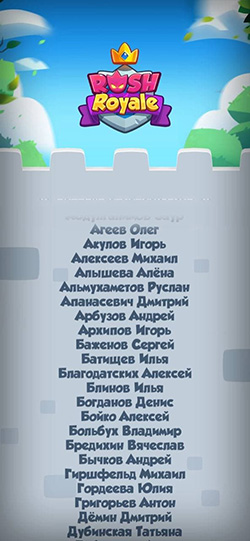Round table: Why don't the names of developers appear in mobile games?
Premium projects usually have a section with titles, where they indicate, if possible, all those involved in the creation of the project. However, for some reason this is not accepted in mobile development. Why did this happen and what can be done (and whether it is necessary) to fix the situation, we asked the leading mobile gaming companies.
Hidden City, G5 Games
Why is it very rare to see a list of their developers in mobile games?
Vlad Suglobov, CEO and Co-founder of G5 Games
From the point of view of the development process, the premium game and the mobile freeplay game differ very much. If the development of a premium game is more or less a finite process that takes a long but limited time, and after the game is released it stops or switches to support mode, then the development of a mobile free–play game, especially successful, begins a couple of years before release, and actively continues for many years after.
We are still actively developing games that entered the market 10 years ago. Such games often look very different than when they entered the market. The team that has been working on the game for many years, as a rule, has also changed (either completely or very much).
Dozens, if not hundreds of people have been working on the game for 10 years: someone worked for a month, someone for 6 years. In what order should they be specified in Credits? According to the number of months or years worked, or according to who was the first, or according to whose ideas turned out to be the most useful for scaling the game, and who can evaluate it?
Also, do not forget that the game may not be made from scratch, but as is often the case, based on the game or on the engine, or on the balance of our other game / several games. Perhaps this was an important element of the game's success. Should then the "authors" indicate dozens of all those who worked on the game or the games that were taken as a basis?
Roman Marshev, Brand/PR Director of Nekki
The list of developers in premium games is just a repetition of the practice established in the film industry. Premium games, like movies, were usually released as a finished work, which was worked on by a single team. And this team showed that its members were responsible for a certain statement that was behind the game. Of course, some premium games have long mutated into services, but the habit of making titles still remains.
In most cases, mobile games have never claimed to be a statement, release is by no means the final point, and many projects can completely change during the operation process. In this regard, mobile games are more like IT services than movies, music or books: you don't try to leave a mark on culture in advance, you test hypotheses on the prod and then something comes together. Sometimes it leaves a bigger mark than anything highly artistic.
Anton Reinhold, Chief Operating Officer, Nexters
Perhaps this is due to the fact that mobile freeplay and traditional games on consoles and PCs originated in different conditions and went through different evolutionary paths. Initially, boxed products were released on the "big" platforms, which were delivered to stores in a completed form. Their development was a process with an absolutely linear structure, clearly marked by a beginning and completion.
In such a situation, it was quite natural to adopt the approach to titles adopted in the film industry: here is the finished game, and here are the people who made it come into being. Even now, when the situation has changed in many ways, and more and more companies are trying to switch from the old model to GaAs, traditions remain strong. Therefore, titles with a list of developers and other personnel involved in the creation, promotion and operation are available even in modern online games. At the same time, the games themselves can be in the open beta testing stage for years and are constantly being updated, which makes it difficult to understand where at least a symbolic point can be put in this process.
But the mobile frituplay worked differently from the very beginning. These were almost immediately games that were constantly being supplemented and modified. In them, the line between the statuses "in development", "technical launch", "softlonch", "release" has always been particularly shaky. Perhaps that's why almost no one thought to bother with titles in such a game. Moreover, titles in mobile games have a very real chance at some point to acquire simply unimaginable, cyclopean dimensions.
Dmitry Shubeikin, CEO of Deus Craft (MY.GAMES)
This is due not only to a certain industry standard, but also to its peculiarities. For example, a movie or an AAA project for the most part has a clear start and end time for the project. Thus, all those involved can be counted.
Our work is arranged differently. The average life span of a successful project is 7 years. Moreover, during this time, the team not only expands and gradually changes (not everyone is ready to work on one project for 7 years in a row), but it also happens that one company started the project, and then another continues. We are not talking about the freelancers involved and other studios who are sometimes assigned parts of the project. Thousands of people can have a hand in the game in 7 years. And everyone's contribution will be very different. Plus, it is not always possible to reconstruct in detail the chain of events, who was responsible for what.
Boris Burangulov, producer of War Robots at Pixonic (MY.GAMES)
I think this is not a question of the platform, but of the sales model. Mobile games are most often GaAs products that don't run out. As a rule, the development of such games is carried out throughout the life of the project, and during this time the team changes a lot. It is a common situation when a fresh update of a long-lived project is done by a team where only a couple of people caught the first release of this game. Therefore, it is difficult to even say who should be reflected in the credits? The one who made the first release? The one who participated in the important features? Who has passed the probation period?
Elena Grigoryan, Marketing and Advertising Director of MY.GAMES
Indeed, there is no widespread practice according to the instructions of the authors in free-play (including mobile) games. This can be attributed to the fact that the fritupley product is constantly evolving, so it is quite difficult to specify the authors, the list is constantly updated.
How do you feel about this practice, don't you find it unfair?
Vlad Suglobov, CEO and Co-founder of G5 Games:
From the perspective of many years of experience in maintaining the Credits system in premium games and our attempts to transfer it to mobile free-play games, I can say that any attempts to make such a system on successful free-play projects generate unconstructive dissatisfaction in the team. Those who, according to the rules, are not included in the list, express dissatisfaction with the fact that they are not there. Those who are included may be unhappy with the "dead souls" on the list – people who have been around for a short time and have already left the team and/or the company.
The developers are unhappy that only the publisher's list of testers (we will have a large team working on 5 platforms with a monthly release) is several times larger than the size of the developer team. Marketing is unhappy that they are rarely listed in Credits. Outsourcers are unhappy if their employees are not included in the list and ask to be added, otherwise they are offended. As a result, in my experience, Credits turns into a giant, meaningless and merciless list of all employees of the publisher, developer and outsourcers who somehow had a hand in the project (we are talking about a list of 200 or more people). Just so as not to offend anyone.
And, most importantly, users don't care, and according to our observations, they don't go to this section at all. They don't care what the names of those who worked on the game are (especially if there are 200 of them). It is important for them that the game is interesting. And for it to be interesting, the team should focus on this, and not on demotivating arguments about where their name is on the list, as if this is the most important result of their work. Therefore, after analyzing the problems that arise with this tradition, at some point we decided to abandon this practice.
Roman Marshev, Brand/PR Director of Nekki
It seems that there is no point in seeking justice here. If the development team wants to, they will certainly make a list and figure out how to arrange it. For example, in Shadow Fight 2 we have a story that we originally wanted to tell, and it was quite logical to add titles. And with Shadow Fight 3, even after 4 years, we are still experimenting a lot, hardly any components of the game can be called 100% final. It's the same with Shadow Fight Arena.
As for the recognition of team members, the lists are not the fairest way, it is rather the most comfortable way for the format of films or singleplayer games in the 20th century. Now there are a lot of other ways to make developers famous, for the most part they lie in the plane of PR, community management and HR brand. Another thing is, is it always necessary for the developers themselves?
Anton Reinhold, Chief Operating Officer, Nexters
I don't think that the lack of titles is a consequence of someone's conscious desire to commit, say, injustice. It just happened that way. At the same time, game dev is a very friendly industry, where historically the attitude towards the team and the relationships within it have always been at a very high level.
Elena Grigoryan, Marketing and Advertising Director of MY.GAMES
It is not entirely correct not to specify the names of the developers at all. In the IT Territory studio, we figured out how to solve this problem. We add employees who participated in the development at the start of the project, and then update this list on request if someone specifically asks to add their name.
Credits in Rush Royale
Is it worth waiting for the situation to be corrected?
Vlad Suglobov, CEO and Co-founder of G5 Games:
It is unlikely that the situation will change. It's no secret that in mobile development, scaling game sales is an extremely important element of success, and here the marketing work of the publishing company is very significant. They are also the creators of the success of the game: the team that creates advertising materials, the team that creates tools for buying users, the UA team itself, and all marketing managers working together for the success of the game, and we have dozens, if not hundreds of them. If we pay tribute to the people who wrote part of the game's code, or drew several characters/windows in the game, why don't we pay tribute to the staff who worked hard on the commercial success of the game? This means that the entire marketing team, which is somehow involved in the project, should be included in the list. And here it may already turn out that there are more of them than developers.
What if the game is from an external developer? As a publisher, it has happened that more employees (testers, producers, marketers) have had a hand in the project on our side than on the developer's side. They need to be added to the list of authors, otherwise it won't be very fair, but it will look strange to the developer.
Roman Marshev, Brand/PR Director of Nekki
If by correcting the situation we mean the massive appearance of titles in mobile titles in one form or another, then this is hardly to be expected. Everything is spinning so fast on the market right now, there are more and more prototypes, iterations are getting shorter. And there are no prerequisites for the formation of such a culture. Titles, they are like GIFs with Kratos from God of War, appear only with a very careful approach to details. And this approach is more common either for enthusiasts who live day and night on a project, or for very successful products.
But a more interesting format for representing team members may well become widespread, because a request for an HR brand and more adult work with the community is increasingly being formed, and both of these areas are closely related to communications around developers.
Anton Reinhold, Chief Operating Officer, Nexters
I have not seen any discussion on this topic. At the moment, it is difficult to assess how much, on the one hand, employees are concerned about this issue, and on the other, how much companies feel this need. I can't speak for everyone, but if it's possible to make our employees happier in this way, then we will consider such an opportunity.
Dmitry Shubeikin, CEO of Deus Craft (MY.GAMES)
We have thought about this question ourselves. And they did not come up with anything better than to post the composition of the current project teams on the site. However, even before the implementation, this idea was abandoned. You may be surprised, but not everyone wants to see their name in the public domain (and it's not about the project, although this happens). This is personal data, for the publication of which, according to the law, you need to take additional permission. Thus, we lose some of the people involved.
Is it possible to solve this problem not by adding the Credits section, but in some other way?
Vlad Suglobov, CEO and Co-founder of G5 Games:
There is no problem here and it is not worth looking for it. There is a specific feature of game service development that has been on the market for many years, constantly changing and being finalized. Success here is not only the merit of the development team, but also the merit of a huge number of people involved in this service project. The practice has not caught on in this part of the industry for obvious reasons, which I tried to explain above. I don't think the situation will change. And there is no point, in my opinion, for the reasons described above.
Roman Marshev, Brand/PR Director of Nekki
There are a lot of options in modern communication, I repeat, this is not a problem.
If we are talking about the fame of team members among the players, then these are various AMA formats (Ask Me Anything), streams, devblogs, interviews, etc.
Of the more expensive — Easter eggs in the game.
If we are talking about the industry, then conferences have been doing better here for a long time, and with the transition to remote all the content of offline events is smeared throughout the year, which means that you can accommodate much more interesting personalities and a variety of formats. Plus, of course, the same devblogs, interviews, decomposition of professions within the framework of HR communication. If you need to move wider, then various PR special projects. There are a lot of options, the main thing is to understand what is behind your desire to add a list of developers - a real desire to leave names in history or just a "wish" to make titles "like in a movie."
Anton Reinhold, Chief Operating Officer, Nexters
Titles in their traditional form are not just a list of those who participated in the development. It's kind of an expression of appreciation to those who made this game. And for employees, it is an opportunity to leave their name in the game literally. And it doesn't really matter if anyone ever reads this text running across the screen or not.
A lot has changed over the years. Belonging to the team that developed a particular game can now be determined by the profile on the same social networks. But, of course, offhand, it is difficult to offer an absolute replacement for the titles. However, before discussing implementation options, I would take a closer look at how much and in what form this issue concerns the development team.
In addition, there is, let's say, a common team identity, one of the symbols of which is the company's brand. In our case, we are talking about the Nexters logo. This is the banner under which we all work. And every user who runs any of our games sees it. In a sense, this is also a tribute to everyone who has worked and is working on Nexters projects.
In the same cinema where the tradition of creating titles once originated, almost every film is the product of the activities of a team that gathers for a specific project and which often does not have a stable common symbol. And in the gaming industry, whole teams work more often, so here the demonstration of the team symbol may partly solve the same tasks as the titles.
Dmitry Shubeikin, CEO of Deus Craft (MY.GAMES)
To be honest, it seems to us that this is a recognition problem. And we solve it at the corporate level — we organize meetings with colleagues, lectures, tell each other about our work, drink coffee randomly. And on the last Birthday of our Grand Hotel Mania project, we made a video with congratulations from various people from the team (current employees, remoters and those who joined other projects) with credits at the end. It was great, the video got a very good response.







